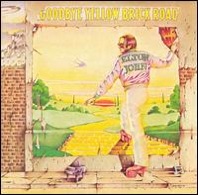
Elton John
Goodbye Yellow Brick Road
In the wake of similarly lengthy excursions by The Beatles and The Rolling Stones, it was deemed necessary for the serious early 70s' artist to produce a double album. Elton John began recording Goodbye Yellow Brick Road in the Chateau d'Herouville, and attempted to finish it in Jamaica. Too frightened to leave his hotel room (things were volatile...) and holed up in his hotel room with a batch of Bernie Taupin's lyrics, Elton wrote twenty-one songs in three days. Eventually returning to the Chateau (via an equally unsatisfactory spell in New York), he surged through the recordings. No central theme held the songs together, the extraordinary "Saturday Night's Alright For Fighting" (about Bernie Taupin's raucous teenage days) contrasted neatly with "Funeral For a Friend," with its Wagnerian instrumentation. The bouncy "Bennie And The Jets" was a cartoon-like tale of a female sci-fi rock band, while the title track, rather obviously, plundered the magical theme of The Wizard of Oz. Again in sharp contrast, "All The Girls Love Alice" proved to be a ballad of a teenage lesbian. The album's finest moment, "Candle In The Wind," took its title from a newspaper cutting that was about the death of Janis Joplin, but the sentiment was for Marilyn Monroe. Twenty-four years later, of course, it would be rewritten for another tragic blonde.
Collins Gem Classic Albums, 1999.
On a new, SACD-hybrid reissue, the album's myriad delights -- from the electrifying "Funeral for a Friend/Love Lies Bleeding" to the blistering boys'-night-out "Saturday Night's Alright for Fighting" -- come across with spine-tingling immediacy. The seventeen tracks are spread between two discs, with B sides and an acoustic "reduction" of "Candle in the Wind" tagging the second. While the value of the bonus tracks is minimal, the original LP seems even more monumental thirty years on.
Bud Scoppa, Rolling Stone, 1/22/04.
When Elton John compared himself to the Beatles, it wasn't just a delusion of grandeur. ‘Revolver lifted them onto a higher plane, and Honky Chateau did the same for us,' he said in 1973. ‘Then they did the White Album, and now we'll have a double, too.' Everything about Goodbye Yellow Brick Road is supersonically huge, from the Wagnerian-opera-like combo of "Funeral for a Friend" and "Love Lies Bleeding" to the electric boots and mohair suits of "Bennie and the Jets." On the title track, John and his songwriting partner, Bernie Taupin, harnessed the fantastical imagery of glam to a Gershwin-sweet melody.
Goodbye Yellow Brick Road was chosen as the 91st greatest album of all time by the editors of Rolling Stone magazine in Dec. 2003.
A superb set from the British artist who has not missed yet. As always, Elton John's keyboard playing is superb, and his vocals range from the raucous rock he has often been associated with to extremely pretty ballad material. LP seems fuller in many ways than some previous efforts, with strong guitar work from Davey Johnstone and excellent background vocals from the entire group. John seems able to sing almost any type of material, from rock to county to Jamaican-flavored tunes, and this double set exposes this even more. As usual, fine words from Bernie Taupin. Best cuts: "Goodbye Yellow Brick Road," "Grey Seal," "I've Seen That Movie Too," "The Ballad Of Danny Bailey (1909-34)," "Dirty Little Girl."
Billboard, 1973.
